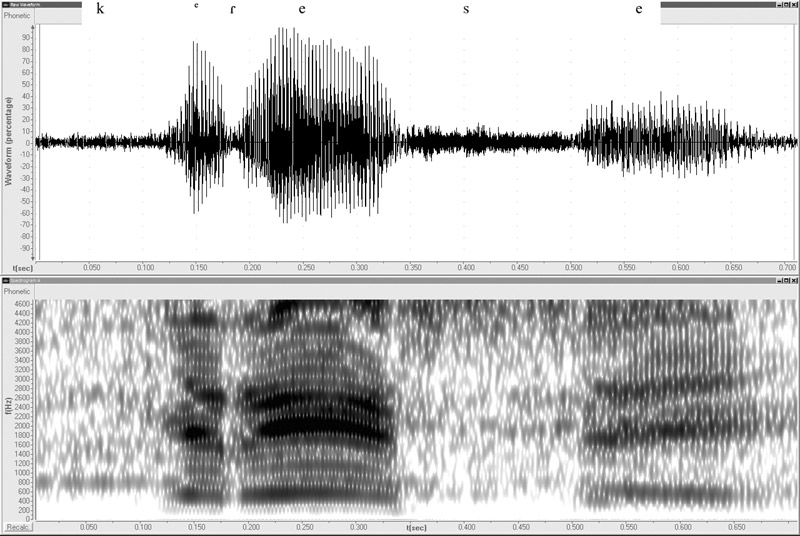Eric, thanks for setting up the phonoloblog! It’s a great way to make data available or make use of data that’s already available on the web.
To follow up on your posting about Bill Richardson’s pronunciation of the word patriota in his recent speech at the 2004 Democratic National Convetion, I went to NPR’s website and found the streaming audio broadcast. (It’s listed under the first hour on their schedule for Wed. July 28, but it’s actually part of the link to the second hour, thanks to Al Sharpton, I guess!) I’ve isolated the paragraph that he delivered in Spanish, as well as the specific phrase that contains the word of interest and, for purposes of comparison, the word crece:
Y es un honor representar nuestra comunidad en esta convención, una comunidad orgullosa, optimista, y patriota … más … y cada día esta comunidad crece en todos los estados. Pero con este crecimiento enorme, vienen más responsabilidades: hay que registrarse, hay que votar, hay que organizarse, hay que ganar. Y nuestro voto … nuestro voto es nuestra voz.
Hear the entire paragraph, y patriota, or crece.
I agree with your explanation of the missing glide. The following spectrogram of y patriota seems to be consistent with the claim that the tap is maximally overlapped by the glide. The red circles indicate what might be the portions of the glide that are heard on either side of the tap, as suggested by your transcription [patjrjota].

Here’s a spectrogram of crece, just for comparison. One obvious difference is that the “peeking” vowel is longer in /kr/ than in the /tr/ of patriota. This is probably related to the fact that velar plosives tend to have longer bursts. The contact area is more extended in velar stops than in labial or alveolar ones (Cho & Ladefoged 1999), and the back of the tongue moves more slowly than the tongue tip or the lips (Hardcastle 1973). The longer release of the /k/ increases the temporal distance between its constriction and that of the following tap.

Assuming his pronunciation of patriota is systematic, I wonder how Bill Richardson would pronounce a prosodically similar nonce form such as CVkrioCV. We would expect the temporal gap between /k/ and the tap to be greater, but how might this affect the timing (and perception) of the tap+glide sequence? If what sounds like [patrota] is really just the perceived deletion of the glide due to maximal overlap with the tap, then a longer interval between /k/ and the tap could make the intervening portion of the glide more audible.
References cited
Cho, Taehong, and Peter Ladefoged. 1999. Variation and Universals in VOT: Evidence from 18 languages. Journal of Phonetics 27, 207-229.
Hardcastle, W. J. 1973. Some Observations on the Tense-Lax Distinction in Initial Stops in Korean. Journal of Phonetics 1: 263-271.
Pingback: phonoloblog » More vowel fragments